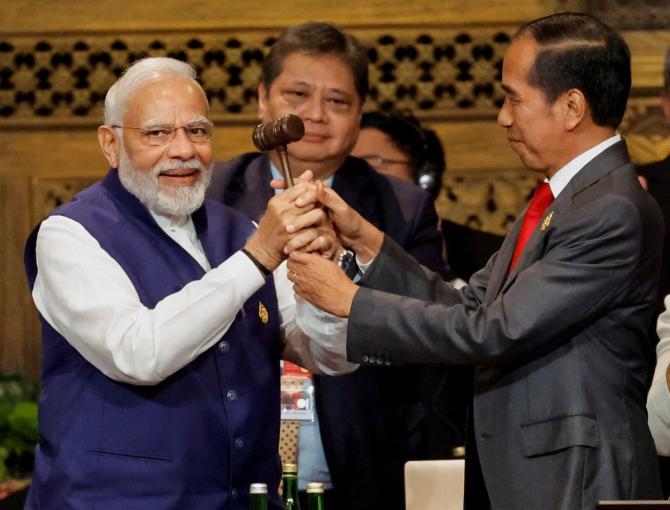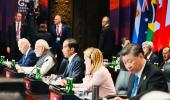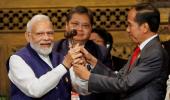As India readies to assume the presidency of the "powerful" G20, Prime Minister Narendra Modi on Sunday said the country should focus on global good during its term and asserted that it has solutions to the challenges related to peace, unity, environment and sustainable development.

India will officially assume the G20 presidency from the current chair Indonesia on December 1.
Noting that assuming G20 presidency is a "big opportunity" for India, Modi said the theme that India has given is “One Earth, One Family, One Future” which shows its commitment to 'Vasudhaiva Kutumbakam' (world is one family).
"The G20 has a partnership comprising two-thirds of the world's population, three-fourths of world trade, and 85 per cent of world GDP. You can imagine -- India is going to preside over such a big group, such a powerful group, from December 1," he said during his monthly Mann Ki Baat radio programme.
"What a great opportunity has come for India, for every Indian! This becomes even more special because India was awarded this responsibility during 'Azadi Ka Amrit Kaal (75th year of India's Independence')," the prime minister said.
The presidency of the G-20 has arrived as a big opportunity for India and it has to make full use of this opportunity and focus on global good and welfare of the world.
"Whether it is peace or unity, sensitivity towards the environment, or sustainable development, India has solutions to challenges related to these," he said.
In his 95th Mann ki Baat broadcast, Modi hailed a "unique gift" from a weaver from Telangana, Hariprasad, who sent the PM a G20 logo woven with his own hands.
The G20 comprises Argentina, Australia, Brazil, Canada, China, France, Germany, India, Indonesia, Italy, Japan, the Republic of Korea, Mexico, Russia, Saudi Arabia, South Africa, Turkey, the UK, the US and the European Union.
Talking about India's upcoming G20 presidency, Modi said there should be welfare of all, peace to all, fulfilment to all and well being for all.
In the coming days, many programmes related to G-20 will be organised in different parts of the country, he noted.
"During this period, people from different parts of the world will get a chance to visit your states. I am sure that you will bring the diverse and distinctive colours of your culture to the world and you also have to remember that the people coming to the G-20, even if they come now as delegates, are tourists of the future," he said in his address.
He also urged people especially the youth to join the G20 in one way or the other.
Modi also hailed the development last week of India sending its first such rocket into space that was designed and prepared by the country's private sector.
"The name of this rocket is -- 'Vikram-S'. As soon as this first rocket of the indigenous Space Start-up made a historic flight from Sriharikota, the heart of every Indian swelled with pride," the prime minister noted.
He said India is sharing its success in the space sector with its neighbouring countries as well.
Just on Saturday, India launched a satellite, which has been jointly developed by India and Bhutan, he pointed out.
He said India is also moving fast in the field of drones and noted how apples were transported through drones in Kinnaur in Himachal Pradesh some days ago.
Talking about advancements in the field of music, Modi said in the last eight years the export of musical instruments from India has increased by three-and-a-half times.
"Our forms of music have not only enriched our culture, but have also left an indelible mark on the music of the world," Modi said.
The fame of Indian music has spread to every corner of the world, he added.
Asserting that it is our responsibility to preserve our traditions and traditional knowledge, Modi cited the example of Nagaland.
The lifestyle of the Naga community, their art, culture and music attracts everyone, he said.
In order to save these traditions and skills and pass them on to the next generation, the people there have formed an organisation named 'Lidi-Cro-U'. The organisation has undertaken the work of reviving beautiful facets of Naga culture which were on the verge of being lost, he said.
In his broadcast, Modi also lauded the efforts of Jatin Lalit Singh from Bansa village in Uttar Pradesh's Hardoi in the field of education.
"I have come to know that it had started a 'Community Library and Resource Centre' there two years ago," he said.
Modi also hailed the efforts of Sanjay Kashyap from Jharkhand, who has come to be known as the 'Library Man' among children in many districts of Jharkhand.
"His mission to open a library is taking the form of a social movement today," the prime minister said.
He said the world of medical science has made a lot of progress with the help of research and innovation as well as state-of-the-art technology and equipment, but some diseases, even today, remain a big challenge.
"One such disease is -- muscular dystrophy! It is mainly a genetic disease that can occur at any age, in which the muscles of the body begin to weaken. It becomes difficult for the patient to do even his small tasks. The treatment and care of such patients require great sense of service," he said.
"We have such a centre at Solan in Himachal Pradesh, which has become a new ray of hope for the patients of muscular dystrophy," Modi said.
He pointed out that the challenge associated with Muscular Dystrophy is also a lack of awareness about it.
"I heartily appreciate all the people trying in this direction, as well as wish the best for recovery of all the people suffering from Muscular Dystrophy," Modi said.










